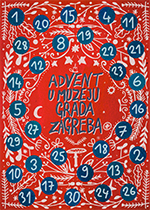Zagreb City Museum, guest appearance in the Historical and Maritime Museum of Istria – Museo storico e navale dell’Istria
Exhibition concept: Iva Prosoli
Exhibition and poster design: Tajana Zver
 Slavka Pavić is one of the most important Croatian photographers of the second half of the twentieth century. She started to work with photography during the fifties of the twentieth century, in parallel with the growing interest in photography and its affirmation as an autonomous art in Croatia. Her active involvement in photography was instigated by her husband, photographer Milan Pavić, when she joined Fotoklub Zagreb in 1951.
Slavka Pavić is one of the most important Croatian photographers of the second half of the twentieth century. She started to work with photography during the fifties of the twentieth century, in parallel with the growing interest in photography and its affirmation as an autonomous art in Croatia. Her active involvement in photography was instigated by her husband, photographer Milan Pavić, when she joined Fotoklub Zagreb in 1951.
Since the very beginnings she would combine her interest for details and structures, as well as an unerring sense of composition. Through her work we can follow the same interest in photo-documentarism in recording the changes in the city as well as in landscapes.
Slavka Pavić often uses the urban landscape as a basis for a dynamic visual game. In the city she finds and highlights geometric shapes with shadows. Through interesting and often unusual cutouts she reinterprets everyday motives. Whether she chooses to use wide angles or close-ups, in the background of her ideas there would often be a story, rarely without a humorous comment. In addition, she would carry out experiments with the medium of photography itself by exploring its possibilities. In doing so, she paid great attention to her work in photography workshop.
Her work can be reduced to a few basic themes: city, nature, human, photography. Formally innovative, open to experiment and questioning art features and technical possibilities of the medium. In her photographs she almost always retains the narrative component, which makes them semantically multilayered, and defines her as a representative of several times mentioned subjective photography.
The concept of this exhibition was made by taking into account the full breadth of occupation and work of Slavka Pavić. Selection of photographs was made in collaboration with the author in order to provide a better insight into her entire artistic oeuvre. Digital prints were made from negatives and author’s blow-ups. The exhibition is not organized chronologically, because of the intention of showing the continuity of ideas and approaches, it is thematically set.
Rich documentation (pamphlets, catalogs, newspaper articles, photographs from the openings ...) which follows the work of Slavka Pavić is presented at the exhibition in digital form. Thus, allowing viewers to understand the broader context by following reception and exhibition conditions during the past decades. For the purpose of this exhibition a half-hour video interview with Slavka Pavić is shot and it is accompanied with a documentary about the author from the series Photography in Croatia.
Slavka Pavić has donated the featured photographs to the Museum of the City of Zagreb, which significantly enriched Collection of photography. At the same time, this is the first major exhibition of Slavka Pavić in the museum context and a wider audience will be given a chance to get acquainted with the importance of her work. Although well-known in photographic circles, Slavka Pavić has not been presented in the width of her work in a well-known museum space.
Iva Prosoli
Biography
Slavka Pavić was born in 1927 in Jajce, Bosnia and Herzegovina. She spent her childhood and adolescence in Daruvar. In 1946, she began to study economics in Zagreb where she lives and works today. In 1951, she became a member of Fotoklub Zagreb and began to exhibit her works. She also collaborated with her husband, a prominent photographer Milan Pavić. She has held 17 solo exhibitions and participated in over 300 group exhibitions at home and abroad, and in doing so won over 90 different awards.
She is one of the founders of the Women's Section of Fotoklub Zagreb, in 1973. With Đuro Griesbach and Vlatko Lozić she co-organized a series of Section’s exhibitions Žene snimaju of which she later became the main organizer. Her works are in the Fotoklub Zagreb’s Collection of Croatian photography, the Museum of Arts and Crafts, the Zagreb City Museum, the Museum of Contemporary Art, the Ethnographic Museum in Zagreb and in various private collections.
Pictures from the exhibition











photo Historical and Maritime Museum of Istria

